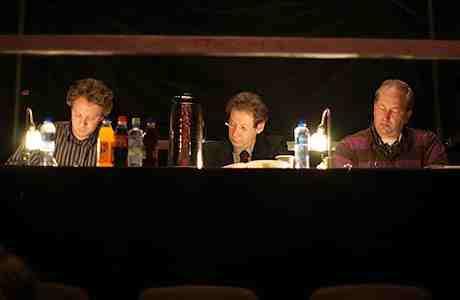I have a wrriten a letter to the editor of Brass Band World magazine following recent correspondence in the debate over the future of brass band adjudication in the UK. With their permission I am re-printing it here. The new edition of BBW is available this week, from 11th March 2010. see their website: www.brassbandworld.com
Please feel free to leave messages (agreeing or disagreeing), make comments or ask questions on my guest book on this site.
The Adjudication Debate - open and transparent
The case for open and transparent adjudication of brass band contests has been well made in recent months and the response by the more vocal of the traditionalists is as depressing as it is predictable.
We live in an age where decision-making by our leaders need to be transparent. We demand and expect rationale and criteria to be behind decision-making that affects the lives of people. In an open and civilised democracy we need this. Our current preferred system of deciding brass band contests is anything but transparent with little or no accountability by those empowered to decide. We still by and large in the UK put trusted and experienced musicians in a box, debilitating their senses and reducing their full spectral hearing. We ask them to write detailed notes whilst trying to follow a score and at the end of a long day accurately put all performances in rank order without any marking criteria to assist, only referring to scribbled notes. We trust two or three experienced musicians often from different musical backgrounds to judge, yet we do not allow their opinions to be counted equally.
This system is now widely recognized as being outdated both within our movement internationally and without doubt on the world scene of musical competitions. Those who argue strongly for the perpetuation of the status quo do so with sincerity and passion, most of whom have dedicated their lives to banding. This is one of the reasons that make it hard to suggest that outdated methods should be discarded. By and large our band movement in the UK operates with a quiet nodding consensus, largely due because we are leaderless. We love to participate but quite happily stare at our shoes when asked to do more, even though we recognise that assistance is needed.
So what to the future? There are some positive signs afoot.
Stan Lippeat's appointment at ABBA and his subsequent statements to the press are encouraging and that combined with his experience and integrity augur well for the decision making that lies ahead . But just where is the limit of the remit for an organisation whose role in banding seems to be akin to an employment agency for adjudicators, when the debate is really centred on the need to evolve judging systems? It is not for them to decide. They can make recommendations, have meetings and publish articles but they're not the governing body. We don't have one.
The second positive sign is the muting of a coming together of the great and good in our movement. The sooner this happens the better, and it must involve progressive thinkers, dynamic people with energy and vision. If and when a new national body can be established so many of the fractious arguments that are acting as a handbrake for the development or even sustainability of our movement can be addressed and new policies put in place.Until then, contest organisers, and it is they who should be selecting the best adjudication methods for their contests, are in a quandary, unsure whether to take the lead or maintain the status quo.
There is no doubt whatsoever in my mind we need to move in the direction of open adjudication, with judges using their skill and experience to mark bands according to a pre-described set of marking criteria, along the lines of that suggested by Philip Harper in this magazine two months ago. By all means let's have meetings to establish the most suitable criteria and a range of marks within each of these that meets the approval of bands and conductors. It should be trialled and evaluated.
Two the main arguments against the system frankly hold no water. Firstly, that all judging should be comparative rather than against a set criteria. The problem I have with this is the lack of detailed critical appraisal for individual performances and the lack of any precise records for comparing band number one with band nineteen, only referring to a few scribbled notes and a brief summary, of course under the current system with no reference to any visual memory whatsoever. The same complainers argue that a Harper-based system may have the marking system that ranges from a score of 45 to 99 and this would be unfair to bands. Well you can't have it both ways? Either you have a transparent system that fully reflects a detailed appraisal of the performance, or you try to group everybody between an arbitrary 82 and 98 points. I would prefer to see a wider spread of marks and then results simply issued in rank order without points attached. The points can be for the private consumption of the band after the contest. In the case of a tie with a single judge he/she can go back and separate tied bands. Where there are two or more judges, one judge is pre-awarded the role of tiebreaker.As I mentioned earlier, if and only if we are using criteria based judging, each judge's marks should count equally and there should be no conferring. It may be more comforting for the judges to have a nice chat about everything but in practice what band's deserve from our experts is to hear their own personal opinions, especially when you have conductors, soloists, composers and experts from another musical fields serving as judges. Surely a cross section of expertise marking to the same criteria will give us a more perfect (dare I say it, scientific) outcome for contests.
I was present at the recent Norwegian championships where open adjudication was trialled in the championship section. All the judges seemed to prefer this (and their interviews can be heard on the 4barsrest podcast), and all musicians accepted this move forwards without question. That said, there were no marking criteria and the judges were allowed to confer, and from conversations I had there it appears that these two points could be addressed in the years to come. The Norwegian Band Federation (NMF) is a strong, well funded organisation, working tirelessly to develop the band movement in their country. Compare and contrast the British system.
We need to pull out our collective fingers and work together, with contest organisers consulting bands and each other. It can be done and there are signs afoot that it may happen. In the meantime let's not pretend that our future is rooted in our past and what was ‘good practice' in the 1920's is the way to operate in 2010.Transparency and accountability wasn't in fashion then, and it is now. Let's move forwards.
S Mead (3rd March 2010)


